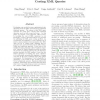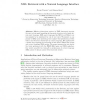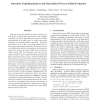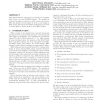140
click to vote
VLDB
2005
ACM
15 years 7 months ago
2005
ACM
Developing cost models for query optimization is significantly harder for XML queries than for traditional relational queries. The reason is that XML query operators are much mor...
124
click to vote
SPIRE
2005
Springer
15 years 7 months ago
2005
Springer
Effective information retrieval in XML documents requires the user to have good knowledge of document structure and of some formal query language. XML query languages like XPath a...
106
click to vote
ADC
2005
Springer
15 years 7 months ago
2005
Springer
XML query caching for XML database-backed Web applications began to be investigated recently. However, the issue of how the cached query results are stored has not been addressed ...
133
click to vote
SSDBM
2006
IEEE
15 years 8 months ago
2006
IEEE
XML has become the standard for data exchange for a wide variety of applications, particularly in the scientific community. In order to efficiently process queries on XML repres...
138
click to vote
ER
2007
Springer
15 years 8 months ago
2007
Springer
XML Schema supports the specification of occurrence constraints by declaring values for its min/maxOccurs attributes. These constraints are structural in the sense that they rest...
119
click to vote
CIKM
2007
Springer
15 years 8 months ago
2007
Springer
XML query languages typically allow the specification of structural patterns of elements. Finding the occurrences of such patterns in an XML tree is the key operation in XML quer...
114
click to vote
DASFAA
2009
IEEE
15 years 9 months ago
2009
IEEE
Existing xml query pattern-based caching strategies focus on extracting the set of frequently issued query pattern trees (qpt) based on the support of the qpts in the history. Thes...
WWW
2001
ACM
16 years 3 months ago
2001
ACM
MSL (Model Schema Language) is an attempt to formalize some of the core idea in XML Schema. The benefits of a formal description is that it is both concise and precise. MSL has al...




